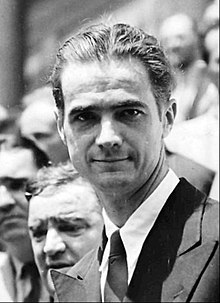This day in history: Howard Hughes died on this day in 1976. Howard Robard Hughes Jr., was an American business magnate, record-setting pilot, engineer, film producer, and philanthropist, known during his lifetime as one of the most influential and richest people in the world. He first became prominent as a film producer, and then as an important figure in the aviation industry. Later in life, he became known for his eccentric behavior and reclusive lifestyle—oddities that were caused in part by his worsening obsessive-compulsive disorder (OCD), chronic pain from a near-fatal plane crash, and increasing deafness.
Hughes was nothing if not eccentric. During Thanksgiving in 1966, Howard Hughes rented out the top two floors of the Desert Inn Hotel in Las Vegas. He enjoyed his time there so much, that he ended up staying through to the holidays. The hotel wasn’t happy about this and they demanded that he leave because they needed room for their high rollers to stay. Hughes bought the place to shut them up.
While at the Desert Inn, Hughes bought the Sands Inn next so that he could remove their bright neon sign that bothered him.
He also bought "the Silver Slipper casino because the rotating structure in the shape of its namesake on top of the building faced his hotel room, and he was convinced a photographer was hiding inside of it, taking pictures of him. After paying $5.4 million, Hughes not only closed the casino, he ordered it completely sealed up." Source
Howard Hughes paid no income taxes, and his tax planning was quite legal. "With a deep-seated hatred of taxes, Hughes went through elaborate plans in order not to pay any. He lived for great stretches of time in hotels in order not to have to claim an official residence, and he would jump around from location to location in avoidance. As he had no will and no children, he left the incredible wealth of his Hughes Aircraft stocks to a tax-exempt charity of his own creation called the Howard Hughes Medical Institute." Source
Even after death, Hughes was interesting. Following his death, Hughes was subject to several widely rebuked conspiracy theories that he had faked his own death. A notable allegation came from retired Major General Mark Musick, Assistant Secretary of the Air Force, who claimed Hughes went on to live under an assumed identity, dying on November 15, 2001, in Troy, Alabama.
Approximately three weeks after Hughes's death, a handwritten will was found on the desk of an official of the Church of Jesus Christ of Latter-day Saints in Salt Lake City, Utah. The so-called "Mormon Will" gave $1.56 billion to various charitable organizations (including $625 million to the Howard Hughes Medical Institute), nearly $470 million to the upper management in Hughes's companies and to his aides, $156 million to first cousin William Lummis, and $156 million split equally between his two ex-wives Ella Rice and Jean Peters.
A further $156 million was endowed to a gas station owner, Melvin Dummar, who told reporters that in 1967, he found a disheveled and dirty man lying along U.S. Route 95, just 150 miles (240 km) north of Las Vegas. The man asked for a ride to Vegas. Dropping him off at the Sands Hotel, Dummar said the man told him that he was Hughes. Dummar later claimed that days after Hughes's death a "mysterious man" appeared at his gas station, leaving an envelope containing the will on his desk. Unsure if the will was genuine and unsure of what to do, Dummar left the will at the LDS Church office. In 1978, a Nevada court ruled the Mormon Will a forgery and officially declared that Hughes had died intestate (without a valid will). Dummar's story was later adapted into Jonathan Demme's film Melvin and Howard in 1980.
This Kindle book, 70 Forgotten Ghost Stories is now available on Amazon by clicking here...and it is only 99 cents and Edgar Allan Poe - An Exhumation is available on Amazon by clicking here...and it is only 99 cents




No comments:
Post a Comment